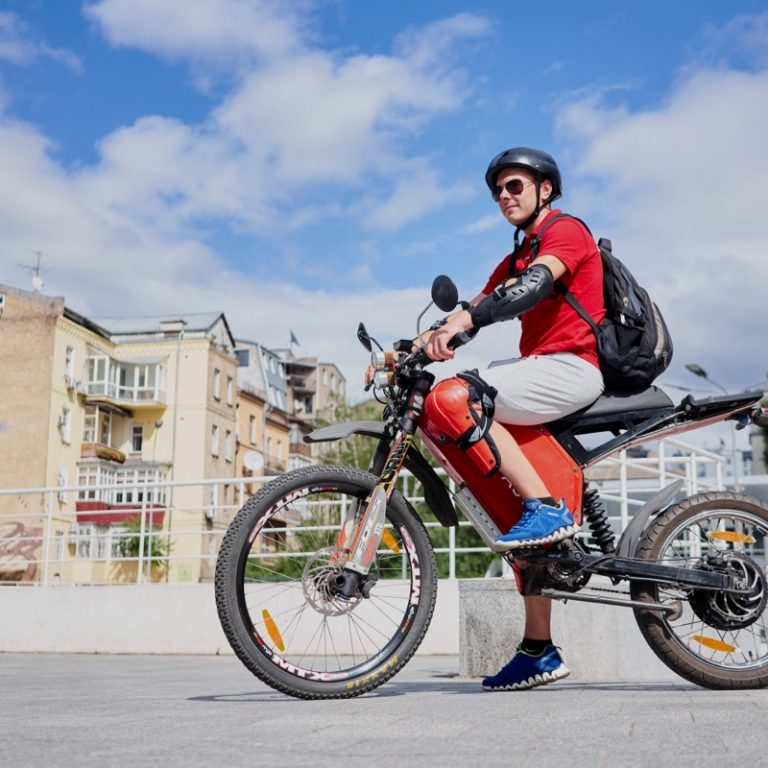Delfast, a Ukrainian company, created an e-bike that can go farther than any other bike in the world on one battery charge. The company works with international clients and develops new models for leisure, as well as professional use.
Bicycles are one of the most widespread types of transportation; they are used by over one billion people. Their popularity stems from their accessibility and ease of use on the one hand, and, on the other hand, they are more environmentally friendly, mobile, and allow commuters to avoid city traffic. As of 2019, over 20% of daily commutes in three European cities — Copenhagen, Amsterdam, and Rotterdam — were by bicycle. In Copenhagen this number went up to 41%, as people there could use rented bicycles for free within city limits. European countries work on popularising the use of two-wheeled transportation by creating separate lanes, setting up rental and maintenance stations, parking spaces near supermarkets and train stations, and so on.
The advantages of a bicycle over other types of transportation are obvious: it is cheaper, easier to use, and does not require a driver’s license or fuel. However, there are cases when using bicycles can be inconvenient or even impossible. For example, they cannot be used by people with physical limitations. Some difficulty arises when it comes to long distances or multiple trips in a single day. This and other aspects gave a push to improving the traditional two-wheel transportation.

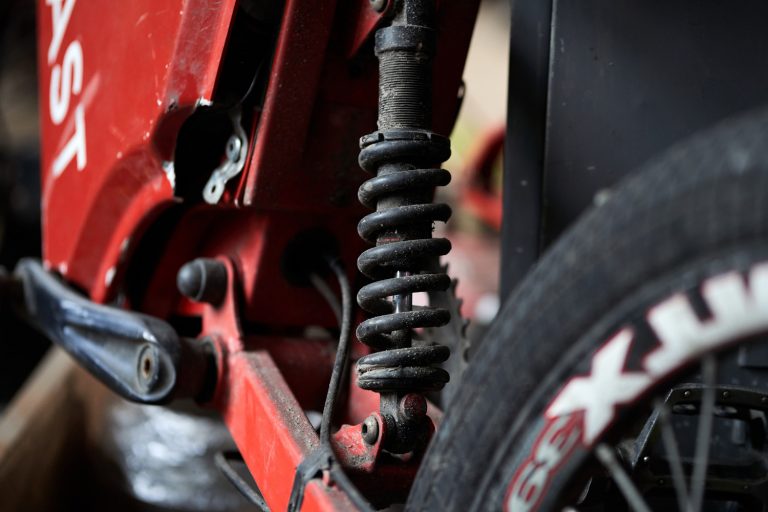
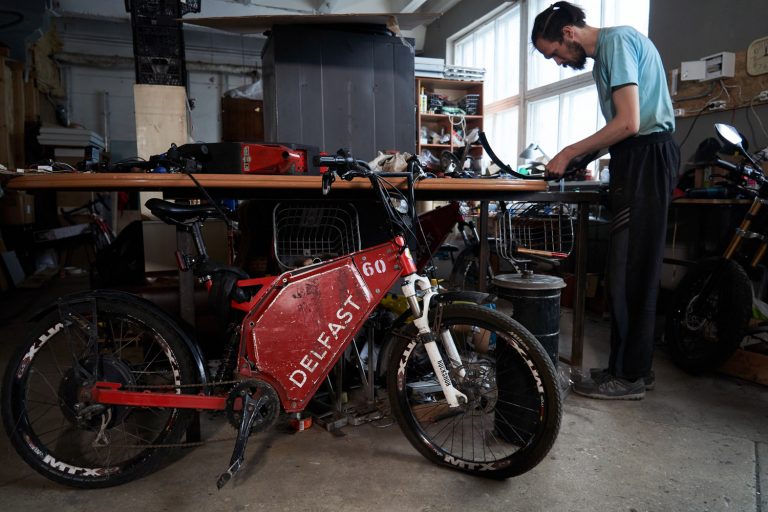
slideshow
Evolution of the bicycle
An electric bicycle, or an e-bike, is a bicycle that is started primarily by an electric engine. Pedals become secondary and are used for speeding up or when the battery charge is low. Such bicycles can travel at different speeds with an average speed of 25-50 km/h and can go different distances on a single charge: for typical models it ranges between 30 and 120 kilometres; however, there are specialised electric bicycles that can go up to 350-400 kilometres without any additional charging. There are models that function similarly to small motorbikes.
It may seem that an e-bike is a relatively new type of transportation. However, the first patent for a battery-driven bicycle was granted to an American, Ogden Bolton Jr., back in 1895. But it was practically impossible to use for transportation without constant control over the battery’s current (its charging and discharging). There were more attempts at creating a bicycle with more power at the beginning of the 20th century. The first models were powered by various sources of energy, such as steam or petrol engines, but an electric engine turned out to be the best option. The first commercially successful electric bicycles appeared on the market approximately 100 years after the first prototype — in the 1990s. At the beginning of the 2000s, two Japanese companies, Yamaha and Panasonic, began producing them for the mass market.
Electric bicycles, unlike vehicles with a petrol engine, do not pollute the air. Due to this fact, more and more people who are concerned about the environment, are choosing them over other means of transportation. According to the forecast of Electric Bikes Worldwide Reports, by 2050 approximately every fourth person on earth will have an electric bicycle, which is nearly 2 billion people. As of 2020, there are 200 million e-bike owners all over the world.
There are a few companies in Ukraine that manufacture battery-powered bicycles. Eleek, for example, is a company from Ternopil that develops and tests new models. The Evel company in Kyiv converts regular bicycles into electric ones and sells the accessories for the process. Delfast produces high-speed electric bicycles with all the required components for customers in Ukraine and abroad.
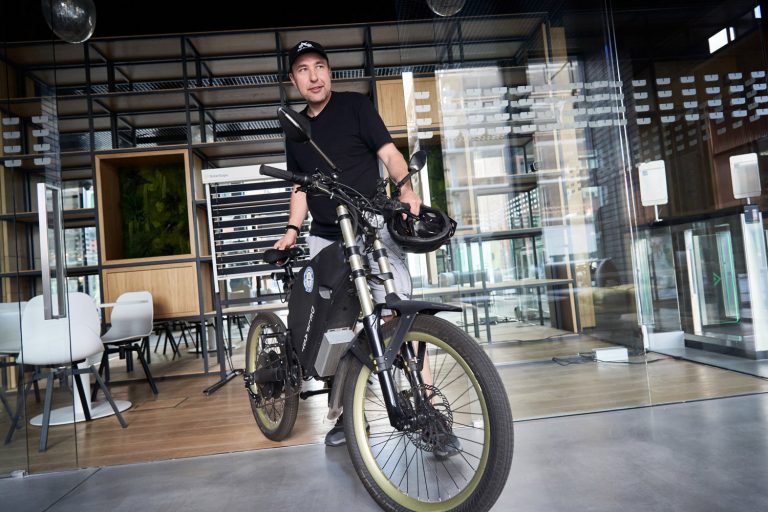
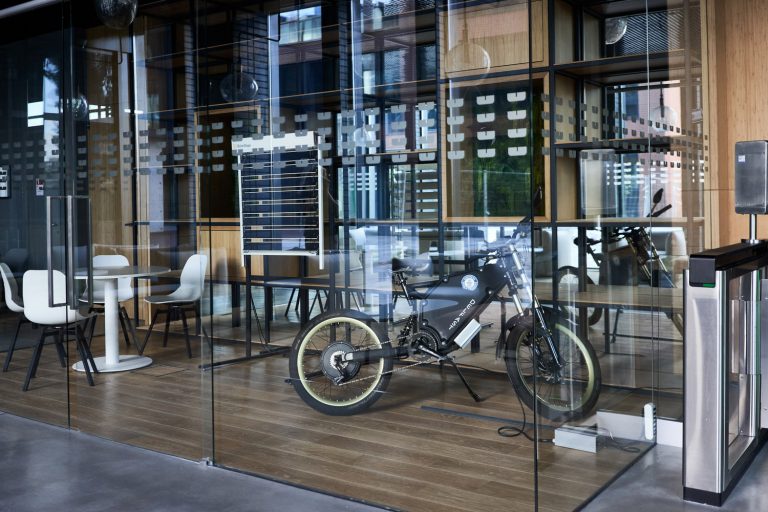
slideshow
From eco-friendly delivery to a world record
Delfast has been operating in Ukraine since 2014 as a delivery service. Their couriers on electric bicycles were the first who could deliver online orders all over Kyiv in under an hour. Danylo Tonkopiy, the founder, recounts that it was important for him to use an eco-friendly type of transportation for his business.
— I spent my whole childhood and youth in Almaty — a city with constant smog (due to transport emissions and outdated equipment at many factories — ed.). My father is an ecology professor, and my childhood books were about environmental problems in the region. I am a fan of electric vehicles so there was no question what to ride on and deliver with.
However, it became challenging for us to choose the right type of vehicle. Couriers were getting tired quickly when riding standard bicycles, while most of the electric models on the market were not fit for the delivery business:
— We tested dozens of e-bikes from various manufacturers. 99% of e-bikes are used for leisure riding: to go to a park on a weekend or ride to a grocery store. They are mostly for fun, like a toy. And we actually turned electric bicycles into a professional means of transportation that can go all day without any additional charging.
Standard electric bikes can go 30-40 kilometres on one battery charge. This distance is too short for couriers as they need to work all day. and each charge takes a few hours. That is why the company decided to create its own electric bike. They invited Ukrainian engineers to work on research and development. In time, they accomplished the impossible: a bicycle that can go 370 kilometres on one charge, which broke the world record.
Thanks to their e-bikes, Delfast has shortened the CO2 emissions into the atmosphere by over a million tons (as of 2020), and such a reduction increases every day. Danylo explains this choice of transportation for his employees not only by its eco-friendly features but also efficiency. According to him, a motorcycle uses about 3-4 litres of petrol per 100 kilometres, which costs about $3.50 (100 UAH). For the same distance, an e-bike uses 1 kilowatt, which costs about $0.07 (2 UAH). These bicycles can be charged from a standard outlet, with no need for additional devices. The first 70% of charge is reached within the first hour; the rest takes about 5 hours.
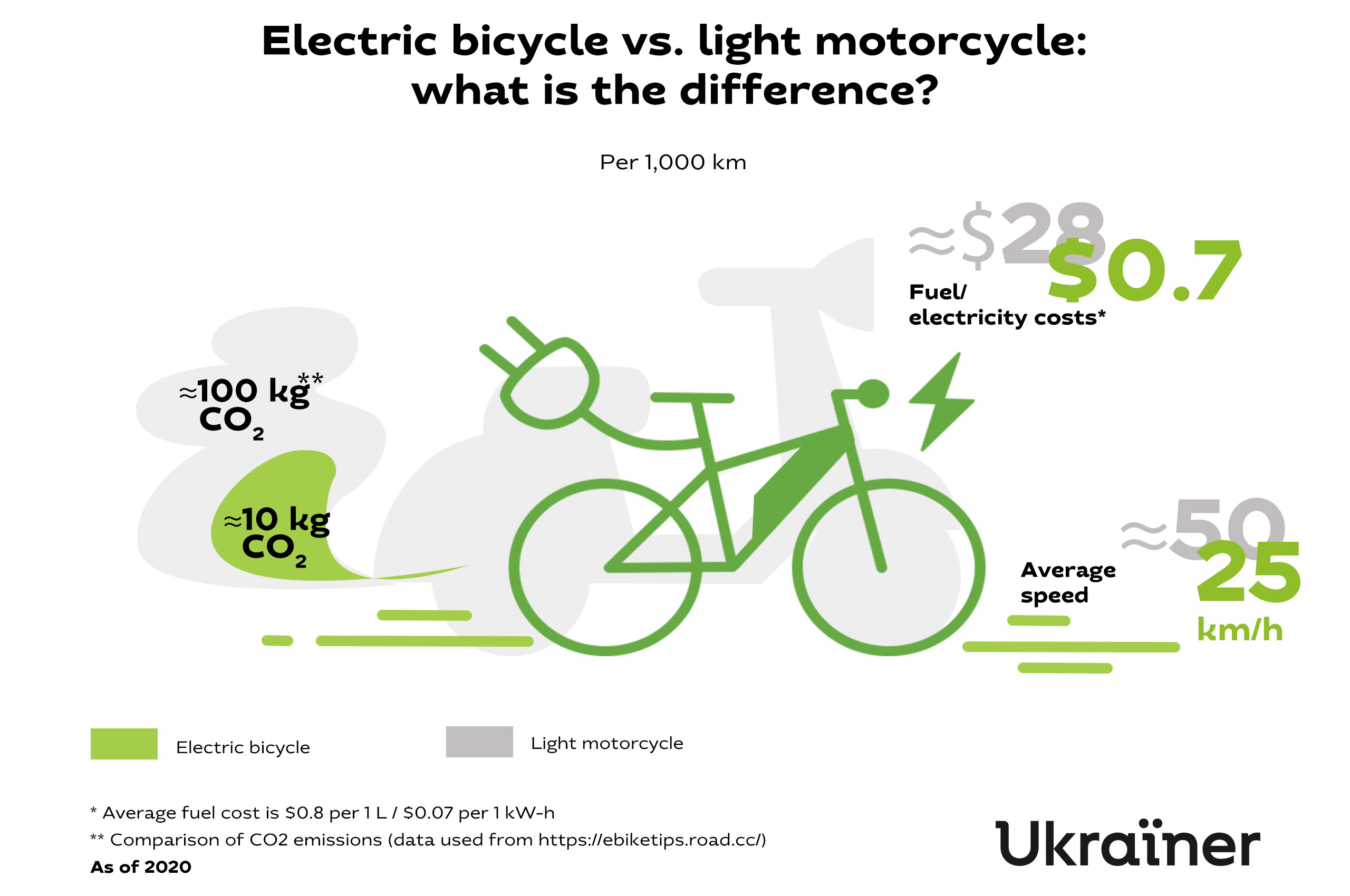
In the autumn of 2017, Delfast hosted a campaign on Kickstarter (a global crowdfunding platform focused on creative initiatives — ed.) to raise funds for the production of their electric bicycles. The goal of $50,000 was reached within one day, with $150,000 raised in total.

Delfast e-bike models
The company has developed five models of e-bikes. They are similar in design but vary in their specs: battery capacity, engine power, and electronic components. The first model, Delfast Partner, can go about 100 kilometres on one battery charge. This e-bike is created specifically for delivery couriers: it is light and equipped with all the necessary features, such as a GPS, an alarm system, remote start, engine lock, and so on.
The second model is called Delfast Prime and it is the one that beat the world record in 2017. Vitalii Arkhipkin, an amateur cyclist who was riding this bike on a Kyiv cycle track during the record-setting, had to ride in circles for 16 hours, keeping the same position. During this whole time he only took one 2-minute pit stop.
This story began when, in the summer of the same year, Danylo and Vitalii decided to check how far a Delfast e-bike could go without extra charging. They ended up travelling the distance between Kyiv and Rivne, which totalled 380 kilometres, and filmed the journey. There were some sceptics, however, who refused to believe that a bike with an electric engine could cover such a distance in one go, so Danylo got an idea of how to save his reputation: by setting an official record. Since it was recorded in autumn, the cold temperature shortened the battery life, and the warm clothes, which Vitalii was wearing, added more weight, so the e-bike covered 10 kilometres less than was expected. Nevertheless, they set the record, which no one has been able to break since.
According to Danylo, the next two models, Delfast Top and Delfast Offroad are the most popular. The Offroad falls into a category of so-called “fatbikes,” which are off-road bicycles with wide tires. It was designed for riders who love to go out in different weather conditions, on various terrains, as well as for hunters and fishermen. The e-bike model Top is in the top five fastest bicycles in the world. It reaches a maximum speed of 80 km/h, and can go up to 320 kilometres on one battery charge.
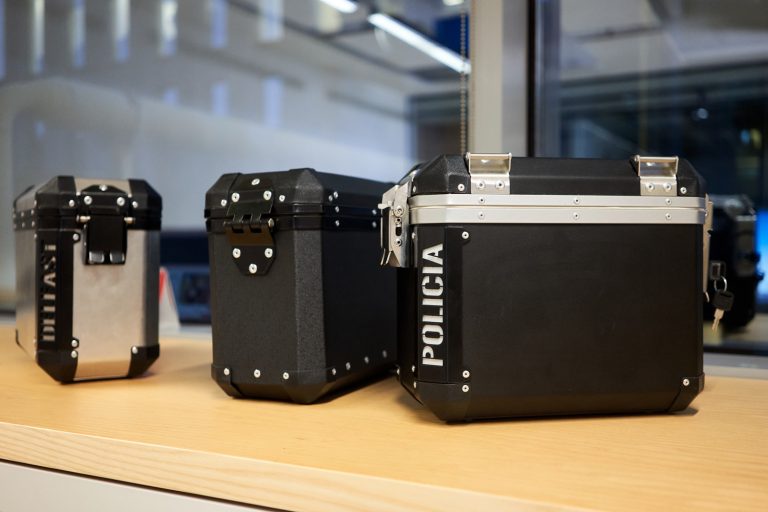
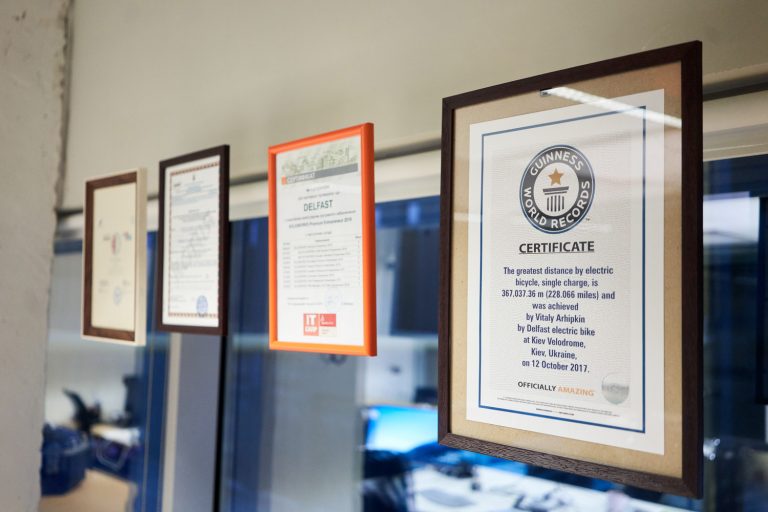
slideshow
At the moment, Delfast is negotiating a deal with the LA police. On their request, Ukrainian engineers have created an electric bike with panniers, mounts for radio transceivers, red and blue emergency lights, sirens, a loudspeaker, and a mount for a rifle. It is named accordingly: Top-Cop. These bicycles are already used by patrol police in Mexico, and they are currently being tested by police officers in another part of the US: in Brevard, North Carolina.
In the autumn of 2020, the company has made a decision to stop producing Offroad and Prime models; it will now focus all its efforts on the Delfast Top model.
The newest model, which has also been released in 2020, is the Delfast Trike: a 3-wheel freight e-bike; its development was funded by a grant from USAID (an independent USA federal government agency that provides non-military assistance to foreign countries — ed.). This model was developed at the request of Nova Poshta, a Ukrainian delivery service. On this bike the couriers can deliver packages of up to 300 kilograms. Danylo is confident — such a bike can also be used by other types of businesses. For example, a coffee machine can be installed in place of the luggage space.
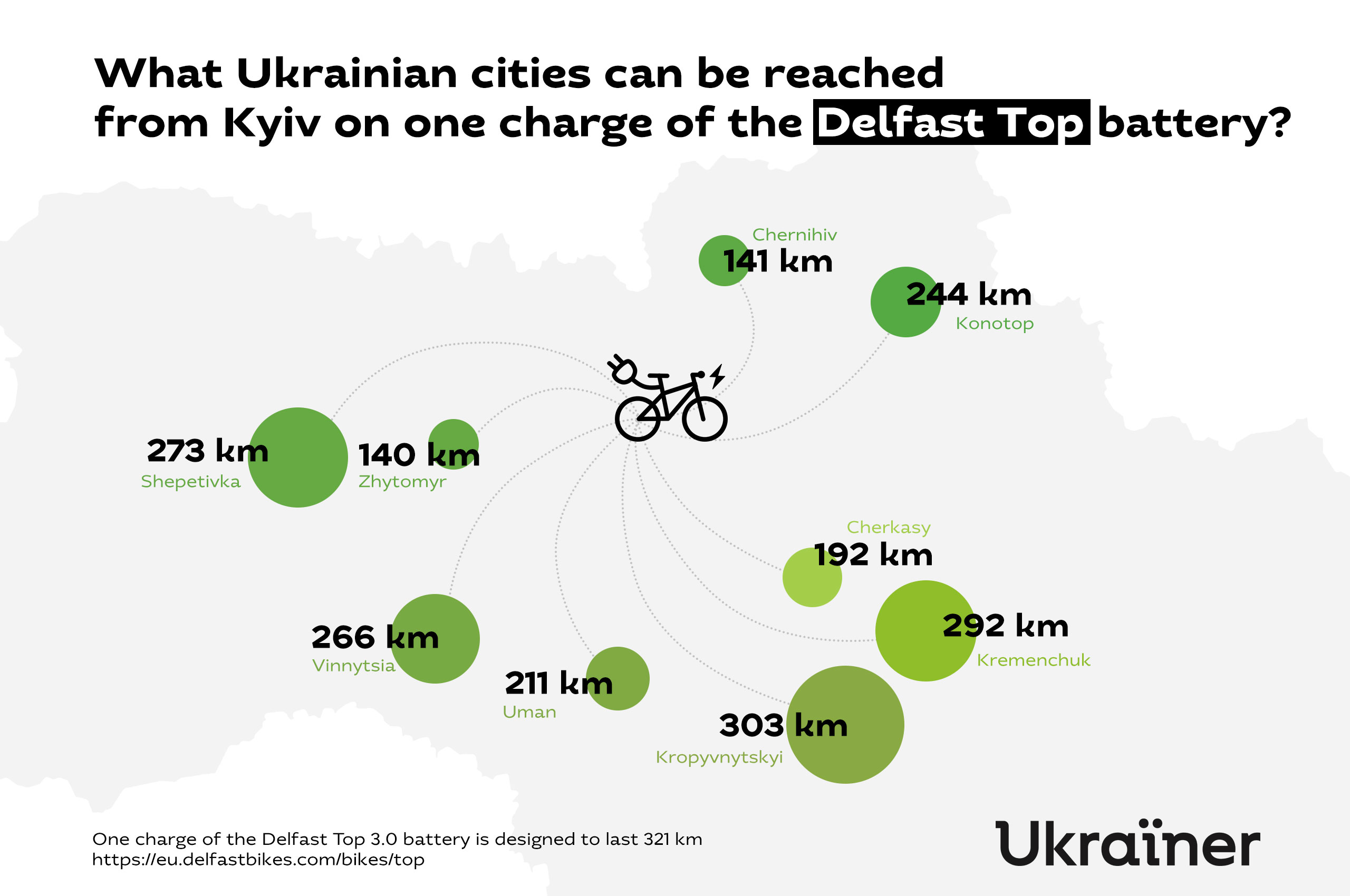
Compared to similar electric bicycles on the market, Delfast models have 30% more power reserve, thanks to the patented battery management system. Recuperation technology allows the battery to partially restore its power during braking. Specially designed software analyses the data coming from all the vehicle’s components and presents it in a phone app. These innovative solutions make the company’s electric bicycles some of the fastest and most powerful in the world.
Currently, Delfast electric bicycles are manufactured in China, but Danylo dreams of bringing production to Ukraine. There is already a signed contract with Kyiv Polytechnic Institute, and Danylo plans to collaborate with them on creating a design lab for making not only e-bikes, but also other types of electric vehicles, such as wheelchairs. Currently, Delfast employees have access to the Institute scientific database and, in return, the company offers work placement for students.

Serhii Honcharov, the company’s engineer, also speaks about their intention to move production to Ukraine:
— When we accumulate some feedback and know-how that require some changes to be made, the offshore factory’s response is rather slow. We have some problems with that. And to fulfil our need for new development we need to set up at least some experimental production. This is a full-cycle production, from a sketch, through a prototype and to the finished e-bike that can be taken for a ride. This is why it’s so important for us to bring manufacturing closer.
In April of 2020, the company received a grant from EBRD (The European Bank for Reconstruction and Development — ed.) as part of the “Climate Innovation Vouchers” project, which is funded by the EU. It allowed the certification of e-bikes in the EU countries and introduction to the European market. Delfast electric bikes have received a new “heart” that now beats in all of their new models — an on-board computer and a battery controller.
The interest in electric types of transportation in Europe will continue to grow in the next few years, which also means a rise in sales, and the e-bikes are already the best-selling electric vehicles in the world. According to Deloitte analysts, e-bike sales in Germany in 2018 alone grew by 36%. This is why Danylo considers this area of business to be very promising:
— I am delighted to see that humanity has come to its senses and started switching from fossil-fuel vehicles to the electric ones, which are much more eco-friendly and clean.
The company’s goal at the moment is to be able to fulfil the demand, as it still significantly exceeds their development capacity. The 2019 pre-orders were for approximately 20,000 e-bikes. Danylo says that during the COVID-19 pandemic even more people began taking interest in the company’s electric bikes and ordering them.

A second life for batteries
The company’s founder jokes that these bicycles can be passed on as an inheritance, because one battery has up to 3,000 charging cycles. Even if the bicycle is charged daily (and most users would not even need that), the battery can last for almost 10 years.
Electric bicycles do not produce emissions during operation, but making their batteries requires a substantial amount of resources. The current models of e-bikes use lithium-ion batteries, which are considered hazardous waste. Delfast offers its customers a disposal and recycling program, which allows them to minimise the impact on environment and to prolong the batteries’ use for decades:
— If such a battery cannot be used for our bicycle anymore, it will suit another purpose; for example, it can be used as a portable charger. This would not require the peak power as electric vehicles do.
In addition to that, the production of lithium-ion batteries is usually done outside the city limits, and is regulated, so the harmful impact on the environment is still much lower than the one from fossil-fuel vehicles.
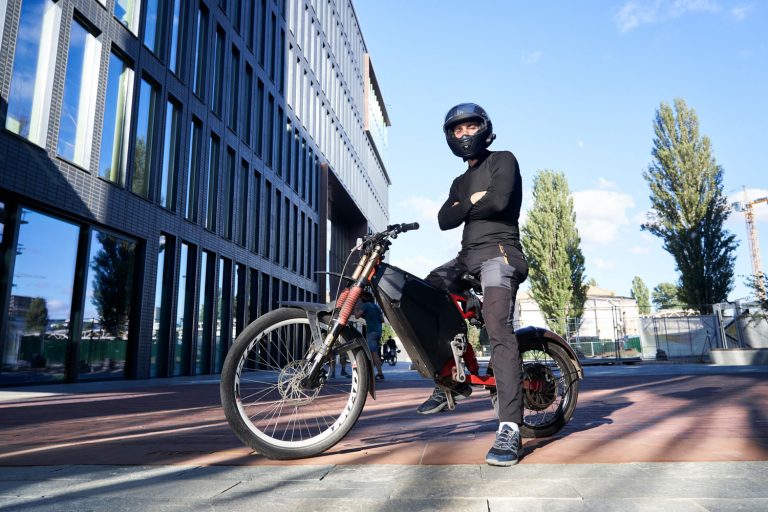
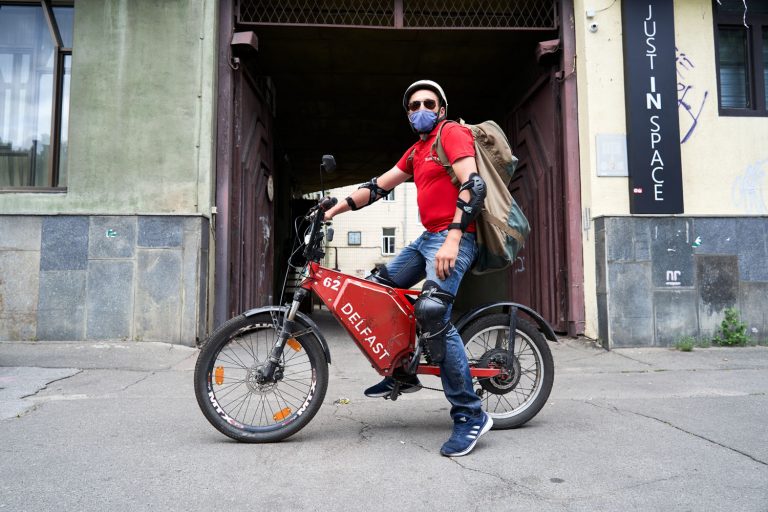
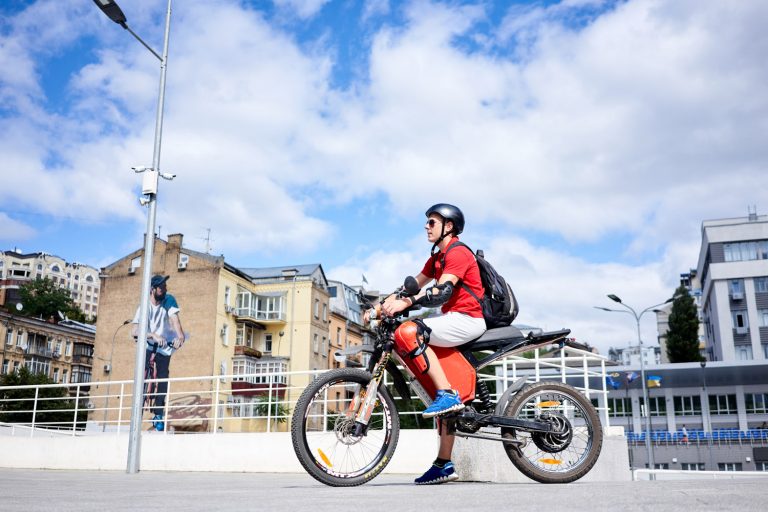
slideshow
Company’s customers
At first, Delfast was producing e-bikes solely for their own couriers. There was no intention of selling them, but people kept asking for them:
— People would always inquire, asking “Do you sell e-bikes?” And we would respond that we did not, that we were a courier service. But people kept asking so often that we had to put a note on our office door, saying “We do not sell e-bikes”. But then we thought, why not start selling them anyway?
Thus, in 2017, another line was opened in the company’s business — production of electric bicycles, — and by the end of that year, 50 people all over the world became owners of Delfast e-bikes. Half of them were from the USA. Most of the company’s client base today is also in this country. 30-35% of the Delfast e-bikes are purchased in the EU. Canada, Mexico, and some other countries are also on the company’s customer list. Ukrainian clients make 1-2%. As of 2020, the company has sold a few hundreds of their bicycles powered by an electric engine.

Anyone can visit their website and place an order. The company mostly works with individual customers from all over the world. Danylo says they are usually small-town residents who enjoy riding bicycles or other two-wheeled vehicles, but who do not want to or are not able to use pedals to go for long distances.
E-bike rental companies, as well as courier and delivery services, are also on the list of Delfast clients. The company has come up with a special credit programme for couriers. Delfast e-bikes are also used by the couriers of an online food delivery company — Glovo — which is very popular in Ukraine. Danylo explains what advantages they see in using these electric bicycles:
— A courier that uses an e-bike for deliveries says, “I go a hundred kilometres a day. In the first month of work I lost 15 kilograms. If I don’t work during the day, I spend an average of $7 (200 UAH) on food. But if I cover a hundred kilometres, I burn a lot more calories and so I spend $17.6 (500 UAH) on food. When I’m on an electric bicycle, I do not burn as many calories or use as much energy, and I can enjoy going for long distances”.
Viktor Novohatskyi, a courier in Delfast, says that an electric bicycle is very convenient for delivery work as it allows preserving more energy and covering much longer distances. Viktor charges his bicycle twice a day, during the lunch break and at night:
— It is quite convenient, because I can charge it from a standard outlet and I don’t need to look for a special charging station.
Volodymyr Kononets, another Delfast e-bike user, says that he covers about 150 kilometres in a day:
— Compared to regular types of transportation, the Delfast e-bike saves time. It can go anywhere. You can take it over any kind of pedestrian crossing: regular, underground ones, or over footbridges.

Despite the fact that Delfast mostly works with foreign customers, Danylo says that he wants to work in Ukraine:
— Ukraine for me is the most comfortable place for living. I like to do business here, and there are opportunities to grow creatively and make something by yourself. It has wonderful cuisine, and nature, and architecture, and history, but most importantly — people. They are the most valuable part of Ukraine.
supported by
Supported by Greencubator and Climate Innovation Vouchers projects, financed by European Bank for Reconstruction and Development, and European Union


